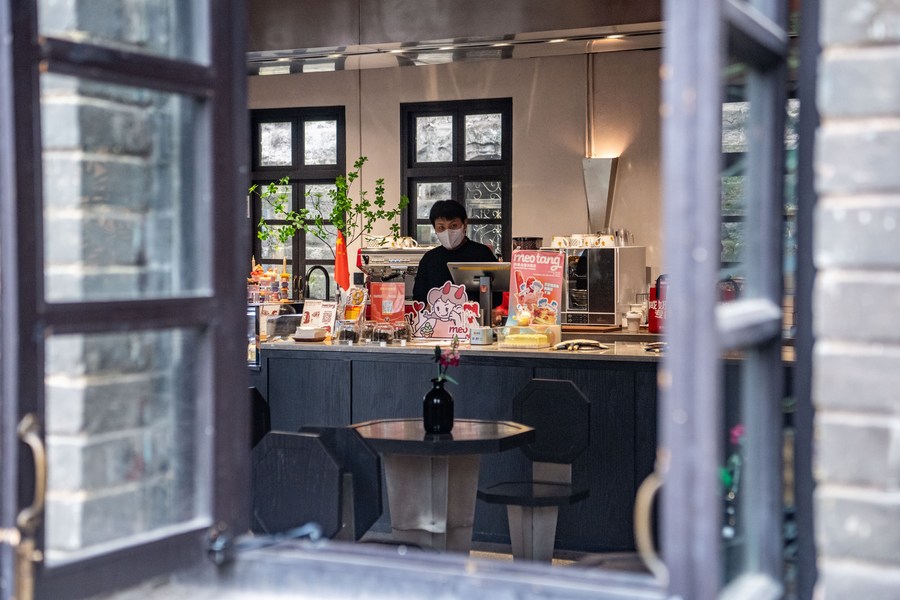Development of coffee in China
It has been more than 100 years since coffee was first planted in China. Over the past 20 to 30 years, China's coffee industry started to show burgeoning growth. In recent years, the coffee market of China expanded by about 20 percent every year, far exceeding the growth rate of the global coffee industry at 2 percent. Research institutes estimated that the output of China's coffee industry will hit 1 trillion yuan ($142 billion) by 2025, showing a huge potential.

A staff member makes coffee in a commercial complex reconstructed from an old building in Yuzhong District, southwest China's Chongqing, Oct. 6, 2022. (Xinhua/Tang Yi)
In 1892, a French Catholic missionary brought coffee seeds to Zhukula village, a village of the Yi ethnic group in southwest China's Yunnan Province. He planted coffee trees in the village and taught locals how to plant coffee, grind coffee beans and make coffee. The local villagers started to drink coffee since then and they still keep the tradition of drinking coffee to this day.
Zhukula village is the first place in China to plant coffee and the place where Chinese first got to drink homegrown coffee. There are 1,134 coffee trees planted in the village, including 24 which are over 100 years old.
Zhukula accounts for only a small proportion of coffee produced in Yunnan. In 1914, people of the Jingpo ethnic group, who lived in border areas in Yunnan Province, brought coffee to Ruili city in the province and planted it as a garden plant. In 1952, researchers from the Yunnan Academy of Agricultural Sciences discovered the coffee species and then promoted the widespread planting of the coffee trees in the province. The coffee has grown into a renowned species.
China's coffee industry has experienced several rounds of development.
From the late Qing Dynasty (1644-1911) to 1949, some regions in China opened the door to the outside world and were engaged in frequent trade with the West. During this period, the coffee industry developed in Shanghai, Nanjing and Guangzhou. In the 1980s, many people came to work in coastal areas in southeast and south China amid the reform and opening up. Coffee became a popular drink for them.
In the 21st century, freshly brewed coffee became popular when coffee brands, including Starbucks, opened in China.
Over the past 10 years, high-quality coffee brands surged, including hand-brewed coffee. Against the backdrop of rapid urban development, a fast-paced lifestyle, and the thriving tertiary industry, urbanites started to show a increasing demand for coffee.
Novel, interesting and delicious coffee products are hitting the market, including those combining traditional Chinese medicine (TCM) ingredients and coffee, as well as alcohol flavored coffee.
Creating a cultural atmosphere, coffeehouses at the Xi'an Inno Start-up Wonderland in Xi'an, northwest China's Shaanxi Province provide a space for hosting salons, training sessions, lectures and reading parties for startup teams.
How coffee is sold has also been evolving, under the influence of the digital economy and delivery services. Many companies, which previously were not involved in the coffee industry, have also entered the industry, including China Post, Goubuli, one of China's longest established food brands from the northern city of Tianjin, and Sinopec, China's biggest oil refiner.
Photos
Related Stories
- International coffee brands confidently expand in China
- Coffee from SW China's Yunnan conquers taste buds of global consumers
- Shanghai's coffee culture reflects city's openness
- Elderly barista delights young customers with aromatic coffee
- Coffee farm volunteer programs enable young people to explore rural areas
Copyright © 2023 People's Daily Online. All Rights Reserved.









